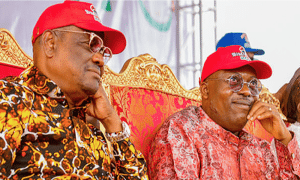
Ongoing legal disputes have aggravated the political situation in Rivers State.
According to Sunday Vanguard, the judiciary in the state has become a battleground for settling political scores, with injunctions being used to bar impeachment proceedings and disputes over legislative defections.
Naija News gathered that the legal disputes in the state were initiated on November 1, 2023.
It all began when a Rivers State High Court located in Isiokpo, Ikwerre Local Government Area of the state, issued a restraining order.
This order was directed towards the State House of Assembly led by Martin Amaewhule and the Chief Justice of the state, Justice Simeon Amadi. The order prohibited them from impeaching Governor Siminalayi Fubara.
Fubara took an interim measure to halt the impeachment proceedings initiated against him by the state legislative arm.
On December 18, 2023, the 25 lawmakers in the House loyal to the Minister of Federal Capital Territory, Nyesom Wike, approached a Federal High Court in Abuja seeking legal backing to continue serving as lawmakers.
Justice Donatus Okorowo issued an order that prevents the Independent National Electoral Commission (INEC) from conducting by-elections to replace the seats of House members who defected from the Peoples Democratic Party (PDP) to the All Progressives Congress (APC) and allegedly flouted the law.
Tensions arose, and President Bola Tinubu invited the warring parties to a peace meeting in Abuja.
During the meeting, which was held on December 18, 2023, the parties signed an eight-point peace accord, now known as the Presidential Proclamation.
The proclamation signed by Fubara and others sparked more disagreement, leading to further litigation.
The Rivers State Elders and Leaders Forum challenged the legitimacy of President Tinubu’s eight-point peace proclamation, arguing that it was inconsistent with constitutional principles and the rule of law, which led to further legal battles.
The elders, led by former governor Rufus Ada-George, expressed concerns over the president’s directives. They believed the directives were unfavourable to the Fubara administration.
Therefore, the Rivers State Civil Society Organisation approached the court with another suit seeking to sack the 27 lawmakers who defected from the PDP to the APC.
The CSOs, headed by their Chairman Enefaa Georgewill, challenged the legal status of the defected lawmakers and attempted to prevent Fubara from re-presenting the already passed 2024 budget to them.
In a different suit, plaintiffs, led by a member of the Rivers State House of Assembly representing Bonny State Constituency, Victor Jumbo; Senator Bennett Birabi, Senator Andrew Uchendu, Rear Admiral O. P. Fingesi, Ann Kio Briggs and Emmanuel Deinma stormed Abuja with suit to stop Fubara from obeying the presidential proclamation.
The plaintiffs in FHC/ABJ/CS/1718/2023 argued that the agreement was illegal and violated the relevant provisions of the 1999 Constitution.
The plaintiffs requested that the court determine whether Tinubu, Fubara and the Rivers State Assembly have the right and entitlement to enter into an agreement that nullifies or undermines the constitutional and legal efficacy of the provisions of Section 109(I)(g) and (2) of the 1999 Constitution, as amended.
The legal dispute culminated in a recent court ruling that barred Speaker Martin Chile Amaewhule and 24 lawmakers loyal to Wike from serving in the State House of Assembly.
Justice Charles Wali granted an interim injunction, declaring the seats of the defected lawmakers vacant pending further legal proceedings.
Wali’s directive was made in response to a lawsuit filed under case number PHC/1512/CS/2024 by Victor Oko Jumbo, Speaker of the Rivers State House of Assembly, and others, against Martin Amaewhule, Governor of Rivers State, the state’s Attorney General, Chief Judge, and 24 others.
The post Fubara Vs Wike: Eight Court Cases Deepen Rivers Political Crisis appeared first on Naija News.


